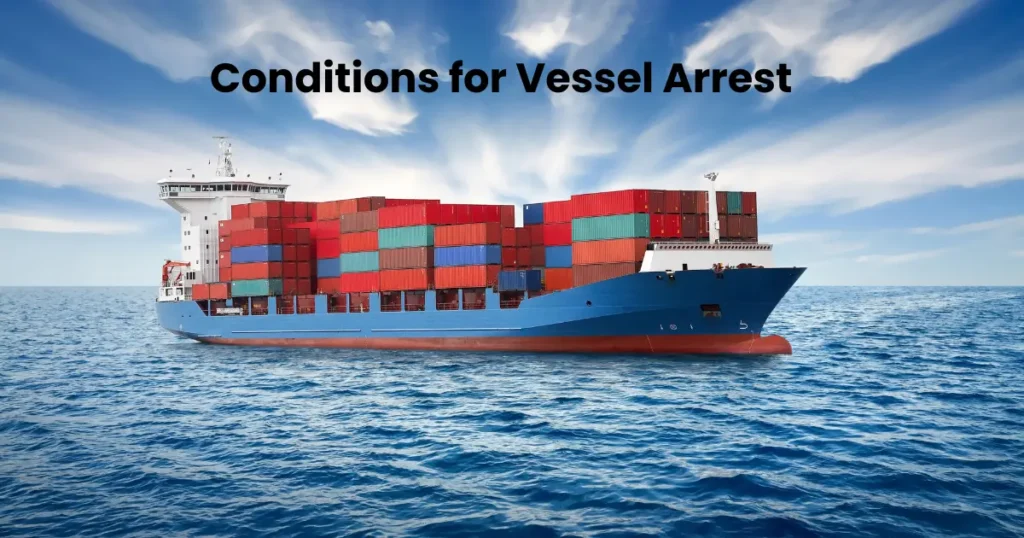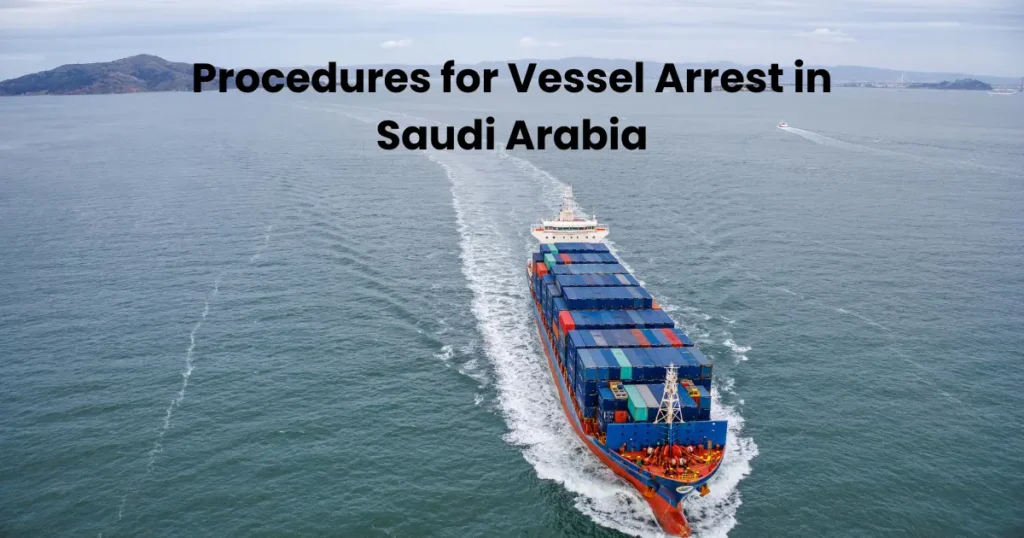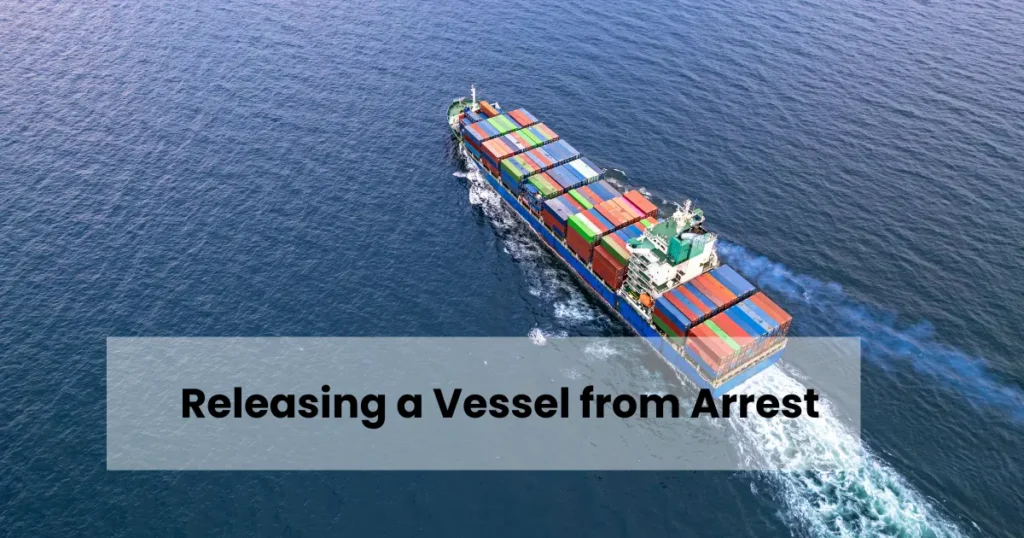Vessel Arrest and Release before Saudi Courts
Vessel arrest is a critical legal mechanism within maritime law, designed to safeguard claimants’ rights in disputes involving ships. The arrest of a vessel entails the temporary detention of a ship under judicial authority to secure a maritime claim or enforce a court judgment. This remedy is widely recognized under international maritime conventions and is an essential aspect of Saudi Arabian law for resolving complex maritime disputes.
Saudi Arabia, being a significant player in the global maritime industry due to its strategic location and thriving ports, has developed a comprehensive legal framework for handling vessel arrests and releases. The Saudi courts, primarily the Commercial Courts, play a pivotal role in adjudicating these matters in accordance with the country’s maritime laws and international obligations.
This article explores the intricacies of vessels arrest and release before Saudi courts, providing insight into the legal framework, procedures, and challenges involved. Whether you are a claimant seeking to secure your rights or a shipowner navigating complex legal waters, understanding the nuances of this process is essential.
Legal Framework Governing Vessel Arrest in Saudi Arabia
Saudi Arabia’s legal framework for vessel arrest is a blend of domestic maritime laws, Islamic principles, and international conventions. This framework ensures the protection of maritime interests while maintaining fairness and efficiency in resolving disputes. Below is an in-depth look at the legal basis and jurisdiction governing vessel arrests in Saudi Arabia.

1. Domestic Maritime Laws
Saudi Arabia’s Maritime Law is the cornerstone of the legal framework for vessel arrest. The law outlines the conditions under which vessels can be arrested, the type of claims that warrant such action, and the responsibilities of claimants and shipowners. These laws are heavily influenced by Islamic (Sharia) principles, which emphasize justice and equitable treatment.
Key provisions under Saudi Maritime Law include:
- Recognition of maritime liens and claims.
- Guidelines for initiating vessel arrest proceedings.
- The role of local courts in approving or rejecting vessel arrests.
2. International Conventions
Saudi Arabia is a signatory to key international maritime conventions, including the 1952 Arrest Convention. These conventions provide additional guidelines for vessel arrests, ensuring alignment with global maritime standards. The conventions also enhance the enforceability of Saudi court decisions internationally.
Key principles from these conventions include:
- Uniform rules for vessel arrest and release.
- Recognition of claims for damage, salvage, and crew wages.
- Jurisdictional clarity for cross-border maritime disputes.
3. Jurisdiction of Saudi Courts
The Saudi Commercial Courts have primary jurisdiction over vessel arrest cases. These courts are well-versed in maritime disputes and are authorized to issue orders for arrest or release.
Key features of the court’s jurisdiction include:
- Authority to arrest vessels within Saudi territorial waters.
- The power to evaluate the sufficiency of claims and evidence.
- Oversight of financial securities or guarantees for vessel release.
4. Role of Maritime Authorities
Maritime authorities, such as the Saudi Ports Authority and the Coast Guard, play a supportive role in enforcing court orders. These entities ensure that detained vessels comply with arrest orders and assist in releasing ships upon judicial approval.
By combining robust domestic laws, adherence to international conventions, and efficient judicial mechanisms, Saudi Arabia offers a reliable legal environment for addressing vessel arrests and releases. Navigating this framework, however, requires in-depth legal expertise and strategic representation, which can be provided by experienced law firms like Dr Abdulrahman Baamir Law Firm.
Conditions for Vessel Arrest
Vessel arrest is a powerful legal remedy, but its application is strictly governed by specific conditions to prevent misuse and ensure fairness. In Saudi Arabia, the arrest of a vessel is permitted only under well-defined circumstances, aligned with maritime law principles and international conventions. Below are the key conditions for initiating vessel arrest before Saudi courts.

1. Valid Maritime Claim
The claimant must have a valid maritime claim to justify vessel arrest. Saudi Arabia’s maritime laws recognize claims arising from the following:
- Damage caused by the ship: Including collisions and environmental harm.
- Salvage operations: Compensation for assisting a ship in distress.
- Unpaid crew wages: Legal priority is given to claims related to crew compensation.
- Charter disputes: Non-payment under charter agreements or breach of contract.
- Cargo claims: Loss, damage, or delay of goods during transport.
- Supplies and repairs: Non-payment for services rendered to the vessel.
These claims must be clearly documented and substantiated to proceed with an arrest.
2. Jurisdiction of the Vessel
The vessel to be arrested must fall under the jurisdiction of Saudi courts, which includes ships:
- Docked at Saudi ports.
- Operating within Saudi territorial waters.
Foreign vessels transiting through international waters near Saudi Arabia are generally exempt unless they voluntarily enter Saudi jurisdiction.
3. Evidence and Documentation
The claimant is required to present sufficient evidence to support their claim. This includes:
- Contracts, invoices, or agreements related to the dispute.
- Proof of non-payment or breach of obligations.
- Correspondence between parties indicating unresolved disputes.
Without compelling evidence, the court is unlikely to approve an arrest order.
4. Urgency and Necessity
Vessel arrest is granted when the court deems it necessary to secure the claim. Circumstances that warrant urgency include:
- Risk of the vessel leaving jurisdiction before claims are resolved.
- Likelihood of claimants losing access to compensation without immediate action.
5. Exemptions and Restrictions
Certain vessels are exempt from arrest under Saudi law, such as:
- Warships and government-owned vessels used for non-commercial purposes.
- Ships engaged in humanitarian missions or emergency services.
These exemptions align with international conventions like the 1952 Arrest Convention.
6. Posting Security or Guarantee
Claimants may need to provide a financial guarantee or security to cover potential damages or wrongful arrest claims. This ensures balance and accountability in the arrest process.
Understanding these conditions is essential for successfully pursuing a vessel arrest. Legal expertise is critical to ensuring compliance with these requirements and achieving favorable outcomes. At Dr Abdulrahman Baamir Law Firm, our maritime law specialists provide tailored legal services to secure vessel arrests efficiently and within the bounds of Saudi law.
Procedures for Vessel Arrest in Saudi Arabia
The process of arresting a vessel in Saudi Arabia involves several legal and administrative steps, ensuring that the claimant’s rights are protected while adhering to due process. Below is a comprehensive overview of the procedural requirements for vessel arrest before Saudi courts.

1. Filing a Claim for Vessel Arrest
The claimant initiates the process by filing a formal request with the appropriate Saudi court, typically a Commercial Court with maritime jurisdiction. The claim must include:
- A clear description of the maritime claim, such as unpaid dues, cargo disputes, or damages.
- Supporting documentation, including contracts, invoices, or evidence of breach.
- Identification details of the vessel, including its name, registration, and ownership information.
The request should demonstrate that the claim is legitimate and falls within the scope of maritime disputes recognized under Saudi law.
2. Court Review and Approval
Upon receiving the claim, the court evaluates its validity and determines whether the vessel can be arrested. Key considerations include:
- The nature of the maritime claim.
- Adequacy of evidence provided by the claimant.
- Risk of the vessel leaving Saudi jurisdiction.
The court may require the claimant to post a security bond or guarantee to cover potential damages if the arrest is deemed wrongful.
3. Issuance of Arrest Order
If the court approves the claim, it issues an arrest order, which is communicated to the relevant authorities, including:
- The Saudi Ports Authority.
- The Coast Guard or local maritime officials.
- The vessel’s captain or representative.
This order authorizes the detention of the vessel within Saudi territorial waters or ports.
4. Enforcement of the Arrest Order
Maritime authorities enforce the court order by detaining the vessel. Actions typically include:
- Restricting the vessel’s departure from the port.
- Informing the shipowner or operator of the arrest.
- Securing the vessel under supervision until the legal process concludes.
The enforcement process is swift to prevent the vessel from leaving jurisdiction.
5. Notification to Interested Parties
The claimant must notify all relevant parties of the vessel’s arrest, including:
- The shipowner or operator.
- Charterers, cargo owners, or other stakeholders with vested interests.
This ensures transparency and allows parties to address the claim or seek a resolution.
6. Settlement or Court Adjudication
Once the vessel is arrested, the dispute proceeds to resolution. Options include:
- Settlement Negotiations: Parties may agree to settle the claim outside of court.
- Judicial Decision: The court evaluates the case and delivers a judgment, determining the outcome and compensation.
7. Role of Legal Representation
Navigating the vessel arrest process requires specialized knowledge of maritime law. Engaging experienced legal counsel ensures compliance with procedural requirements and maximizes the likelihood of a successful outcome.
Understanding the procedural nuances of vessel arrest is vital for claimants and shipowners. For expert guidance and representation, Dr Abdulrahman Baamir Law Firm offers unmatched expertise in maritime disputes, ensuring swift and effective resolution in line with Saudi maritime laws.
Releasing a Vessel from Arrest
Releasing a vessel from arrest in Saudi Arabia is a critical process that ensures shipowners can resume operations after addressing legal claims. Saudi courts have outlined specific procedures and requirements for vessel release, balancing the rights of claimants and shipowners. Here’s a step-by-step guide to the release process under Saudi maritime law.

1. Resolution of the Underlying Claim
The primary condition for releasing a vessel from arrest is resolving the maritime claim. This can be achieved through:
- Settlement: Both parties may agree on an amicable resolution, often involving the payment of outstanding dues or compensation.
- Court Judgment: The court may decide in favor of the shipowner or order the claimant to withdraw the arrest.
2. Posting Security or Guarantee
To secure the vessel’s release while the dispute is ongoing, the shipowner may provide financial security. The court determines the type and amount of security, which may include:
- Bank guarantees.
- Cash deposits.
- Surety bonds from approved institutions.
This security ensures that the claimant’s rights are protected even if the vessel is released.
3. Filing a Petition for Release
The shipowner or their legal representative must file a formal petition for the vessel’s release. The petition should include:
- Details of the vessel and the arrest order.
- Evidence of settlement, court decision, or posted security.
- Request for the court to issue a release order.
4. Court Review and Approval
The court carefully reviews the petition to ensure compliance with legal requirements. Factors considered include:
- Validity of the security or settlement agreement.
- Evidence that the claimant’s rights are adequately protected.
- Absence of additional pending claims against the vessel.
Once satisfied, the court issues a release order.
5. Enforcement of the Release Order
The release order is communicated to relevant authorities, including:
- The Saudi Ports Authority.
- Local maritime officials and port authorities.
- The vessel’s master or representative.
Authorities then remove restrictions on the vessel, allowing it to resume operations.
6. Notification to Interested Parties
All parties involved in the case, including claimants and shipowners, are notified of the release order. This step ensures transparency and prevents potential disputes arising from the vessel’s departure.
7. Legal Recourse for Wrongful Arrest
If the arrest is proven to be wrongful or without valid grounds, the shipowner may file a claim for damages against the claimant. Saudi courts evaluate such claims based on:
- Evidence of wrongful intent or negligence by the claimant.
- Financial losses incurred by the shipowner due to the arrest.
8. Role of Legal Experts
Successfully releasing a vessel from arrest requires detailed knowledge of maritime law and court procedures. Engaging experienced legal counsel ensures that all requirements are met promptly and efficiently.
Navigating the complexities of vessel release in Saudi Arabia can be challenging without expert guidance. At Dr Abdulrahman Baamir Law Firm, our maritime law specialists provide tailored solutions to secure the swift release of vessels, minimizing disruptions to your business operations while safeguarding your legal rights.
Conclusion
The arrest and release of vessels in Saudi Arabia are intricate legal processes governed by maritime laws and international conventions. These procedures are designed to balance the rights of claimants seeking justice for legitimate maritime claims and shipowners striving to maintain their operational integrity. By adhering to the legal framework, understanding the conditions for arrest, and following the outlined procedures, parties can ensure a fair and efficient resolution of disputes. Saudi courts emphasize transparency and accountability, making it essential for all stakeholders to approach these cases with due diligence and legal expertise.
For businesses and individuals involved in maritime disputes, having the right legal representation is critical to navigating these complexities. At Dr Abdulrahman Baamir Law Firm, we specialize in maritime law and offer unparalleled expertise in handling vessel arrest and release cases. Our team is committed to protecting your rights and achieving favorable outcomes, whether you are a claimant pursuing a claim or a shipowner seeking swift resolution. Trust us to provide reliable, professional, and results-oriented legal services tailored to your specific needs in Saudi Arabia.
